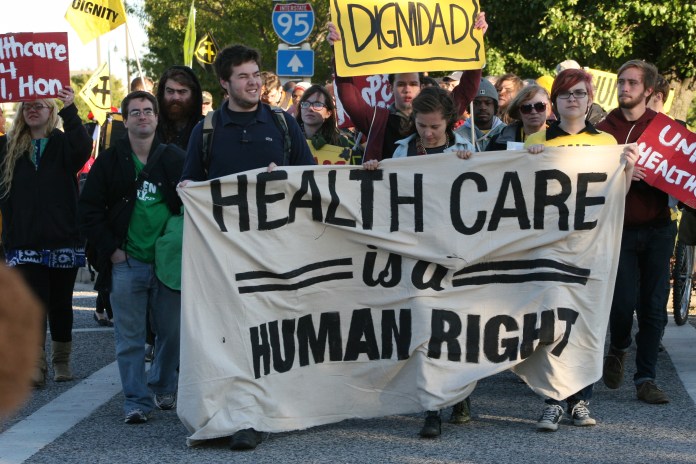Opinion
Story by Andrea Valadez-Angulo
The United States subscribes to a private health insurance system that leaves its citizens to fend for themselves when it comes to finding health care. As of 2021, the U.S. spends more on health care than the majority of other countries, but 30 million people (9% of the population) lacked insurance coverage in the same year.
In the U.S.’s current system, citizens who are able to afford health insurance pay an upfront cost, or premium, to a private insurance company every month that keeps you enrolled in their plan. In addition to this premium, enrollees are also responsible for paying deductibles, coinsurance and copays.
These extra costs deter people from seeing a doctor when needed, depending on how much money they have at the time.
The majority of the population typically receives their private insurance through their employers. For this same reason, individuals who come from lower socioeconomic backgrounds and/or marginalized communities are far more likely to be affected by a lack of universal health coverage.
The U.S. Census Bureau found that “those who worked less than full-time, year-round were less likely to be covered by private insurance in 2020” and the percentage of part-time workers without health insurance was 66.7%. Moreover, this same census concluded that 9.3% of people under the age of 19 were uninsured in 2020.
This is where the argument for universal health care comes in. Many supporters of public health care believe it is a right and that the government should assume the responsibility and ensure that all citizens regardless of income, have access to quality care.
Though many oppose universal health care because of the negative effects it could have on the economy, public health care would actually save money while improving public health.
The Center for American Progress has estimated that the lack of health insurance in the U.S. costs society between $124 billion and $248 billion per year.
A study done by the universities of Colorado and Pennsylvania found that on average, workers with health insurance miss 4.7 fewer days of work than employees who don’t have health insurance. The Institute of Medicine also reports that the U.S. economy loses between $65-$130 billion annually due to a lack of worker productivity among the uninsured who suffer from infrequent check-ups, poor health and premature deaths.
Supporters of public health care point to countries such as Canada, Denmark, the United Kingdom and many more as an example of how universal health care can and should be.
For the purpose of this article, the U.K. will be used as an example seeing as a 2017 U.S. analysis found their health care system to be the best system in the developed world.
In England, all residents are automatically enrolled and entitled to free public health care through the National Health Service (NHS). Some of the services covered by the program are maternity care, necessary dental care, preventative services (screenings, vaccinations, etc.) and mental health care. When citizens go to a hospital, they are not required to pay any type of out of pocket copay.
According to the website for the Commonwealth fund, the NHS “oversees and allocates funds to 191 Clinical Commissioning Groups, which govern and pay for care delivery at the local level.” Citizens also have the option of subscribing to outside private insurers if they wish to have access to more rapid elective care.
The government directly pays for and owns the hospitals and providers that provide NHS care. 100% of the English public benefit from public coverage and as of 2020, around 12% elected to join a private health insurance firm in order to receive faster care.
The majority of NHS funding comes from the taxes citizens pay, and around 20% of funding is raised by national insurance, which is a payroll tax paid for by employees and employers.
The fear of paying more in taxes is one of the biggest proponents of why some Americans are so hesitant of universal health care. However, research has shown that utilizing the payroll tax system would lead to “large income gains” for the majority of workers and the middle-class. This type of system would also widely raise the taxes of the 1% who as of now benefit from the U.S.’s regressive tax system.
As of 2021, public spending on health care in the U.K. was around £177 billion, which equals out to $1.23 billion. So while the general English public does pay more in income taxes than the U.S., their health care spending makes up only 12% of their Gross Domestic Product (GDP). Comparatively, the U.S.’ health care expenditures accounted for 19.7% of GDP in 2020.
There seems to be no reason why citizens in the richest country in the world shouldn’t have access to free and quality health care.
The benefits of universal health care have been seen across the globe, so it seems as though America has a lot of catching up to do in terms of ensuring all its citizens have equal opportunities to live a quality life.

